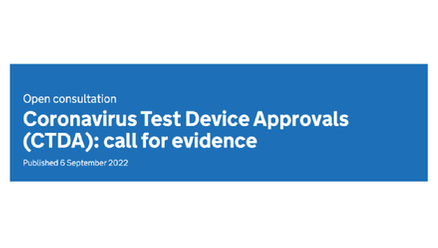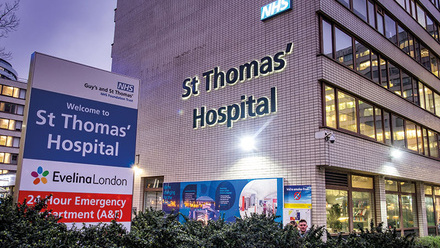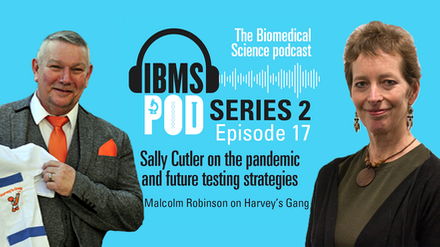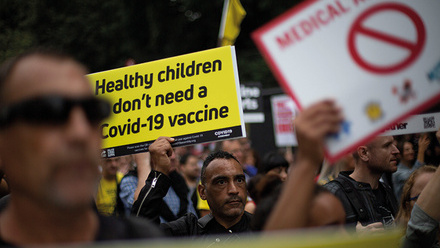We are ready to test – give us what we need
There is a lot of confusion around the notion of testing in the media. Boris Johnson has said that testing is “the way we will unlock the coronavirus puzzle”, the World Health Organisation has proclaimed, “test, test, test” and, last night during the daily briefing, Matt Hancock MP committed to raising testing numbers to 100,000 tests a day by the end of April. On behalf of the biomedical scientists and laboratory staff of the NHS, the Institute of Biomedical Science (IBMS) wants to express the frustration of our members and clarify that we are testing to the limit of our materials and that we are ready to increase capacity – but only if we are given what we need.
Are we ready for the peak of the curve?
In the first instance, the UK did not have a testing strategy. There was the notion that the vulnerable could self-isolate while the rest of the population built up a herd immunity. The approach was not backed up by the public health or clinical community and it put us on the back foot regarding supply chains and global demand. However, the UK has numerous high-quality accredited laboratories with suitable equipment, with the capability to do over 100,000 tests per day, set up and ready to meet testing targets – we just need a reliable supply of test kits, plastics and reagents.
The IBMS has prepared biomedical scientists and laboratory staff in the field. This includes publishing guidance on how to identify non-virologists who have suitable skills for training on COVID-19 testing and how to prioritise laboratory workload in the current climate. The IBMS have also worked with the Health and Care Professions Council (HCPC) to facilitate a temporary register in order to increase registered staffing levels for those able to perform the tests. The workforce has come together around the issue and, in the face of rising demands, made impressive strides to validate and introduce the COVID-19 test in a remarkably short period of time.
However, the problem we are facing is not a staffing issue. Staffing levels are currently adequate to expand COVID-19 testing. Biomedical scientists across the UK have already been re-trained to carry out testing or free up virology trained staff to focus on testing. Local mobilisation is already in place and laboratory staff in the NHS are running a 24-hour service that is using all the materials that they have at their disposal but their skills are underutilised due to supply problems. There is a huge gap between testing equipment capacity and material availability.
Currently, England could process up to 25,000 a day which by May could rise to 100,000, meeting the ambitious target set down by Matt Hancock, all within the NHS. However, there is a material supply issue with a worldwide shortage in reagent kits. The supply of precision plastics that are used with the reagents are not due to be ready until mid-May. This is affecting countries across the world and there is nothing more the workforce can do to increase testing capacity any further. We would urge caution as testing is ramped up to ensure that the supply chain is secured. There is a very real risk that hospitals and pathology networks will run out of reagents and patients will not be able to be tested. This will not only impact upon their care but can lead to hospitals unable to manage all patients safely - as has been seen in other countries.
CEO Doris Ann Williams MBE from the British In Vitro Diagnostics Association (BIVDA) issued this statement on the shortage of reagents for COVID-19 tests:
Provision of the different tests for this new disease is challenging; the IVD industry has been working to support the NHS to implement testing here in the UK, as it has been doing for healthcare systems around the world.
The pinch point is availability from the manufacturers of PCR (polymerase chain reaction) test kits needed to work on their dedicated instrumentation. The Prime Minister is intervening with the global heads of the companies involved to understand when they may be able to supply more test kits.
The Government is also working with other suppliers to see what they can offer and to look at providing reagents to use on PCR instrumentation that does not require specific reagent kits.
This continues with manufacturers doing all they can to ensure continuous supply of the necessary reagents to enable testing during this unprecedented crisis. However, there is global demand and manufacturing capacity is being increased at pace, along with the logistics to distribute it but none of this can be achieved overnight. As an industry, we can assure you that everything that can be done is being done to get testing kits and the materials needed to make them, to the right places as quickly as is humanly possible.
Should we be buying more antibody tests?
There are huge issues surrounding the reliability of point of care antibody tests. Spain is now completely withdrawing their use despite buying millions of them. At least one in ten people who test positive on the antibody test (and are therefore considered to have immunity) will be “false positives” and will not have immunity. Using the skilled workforce we have at our disposal and doing the tests that we know work is currently the best strategy. This will require the NHS to further expand its testing approach to ensure the right tests are performed at the right time on the right people to successfully tackle this worldwide pandemic, supporting and protecting those at most risk from this virus.
How do hospital laboratories test for COVID-19?
The test for the presence of SARS-CoV-2 (COVID-19) has to be done by specialist, skilled staff in a fully equipped and accredited laboratory. It starts with a swab sample taken from deep at the back of the throat or nostril. This is sent to a virology laboratory where a biomedical scientist deactivates it in a safety cabinet (making it safe to work with). They then prepare it for RNA extraction – this occurs in an automated machine. Once the RNA genome of the virus is extracted, the biomedical scientist prepares it for real time polymerase chain reaction (PCR) testing.
PCR testing detects the RNA genome of COVID-19 and copies it into DNA. It then multiplies and measures that DNA – indicating the amount of virus RNA present in the original sample. A report is prepared by a biomedical scientist monitoring in real time. Depending on the laboratory and the machinery, the whole process takes around 6 hours to complete, usually with 24 tests at a time.
Ready and waiting…
For those who were unclear, we hope this clarifies the current position of testing in the UK. The IBMS is proud of our members who work at the heart of healthcare 24 hours a day, 365 days a year. They have gone above and beyond to get the UK into a position to deal with this crisis and are working at capacity. When it is possible to do more tests and the supply chain issues are addressed, the workforce and their vital expertise will be ready.





